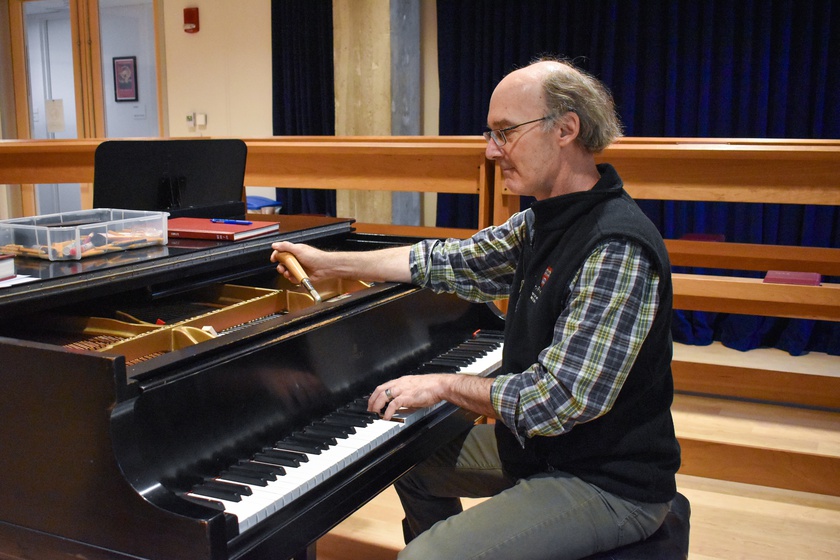{shortcode-ecde7249ba595bc5d31d42e7149dcb9e3016ea78}
We may know Sanders Theatre as a spotlight for Harvard’s musicians — but one peek behind the curtain reveals a lesser known, though equally crucial, musical talent. One out-of-tune piano hardly seems like an emergency. But as the technicians of Harvard’s Piano Shop know all too well, a slightly discordant harmony can make or break a Sanders success.
The Piano Technical Services is composed of a team of four people who work to maintain the 200-plus pianos on campus. In addition to tuning the instruments, they also prepare pianos for concerts, maintain the campus’s harpsichords, and restore vintage pianos.
Piano technician and extended techniques specialist Richard A. Gruenler explains there isn’t really a rhythm to the daily work of a piano tech. “It's really hard to say what day to day is,” he says. “It's more like what month to month is.” At the start of each semester, the technicians tune all of the pianos on campus. In the summer, they focus on rebuilding worn-out pianos and conducting extensive repairs.
Fixing a damaged instrument or tuning a faulty piano is hardly a glamorous process — especially compared to the excitement of a piano concerto. But the intense labor and precision of the technicians’ work is what enables the musical magic we hear onstage.
When we speak to technician Austin L. Grimes, he’s twisting the pins in the diaphragm of the piano in Eliot Dining Hall with a piano tuner key. He looks through the windows and plays the note, observing the change in pitch, before twisting the key again. Amid the buzz of students talking and eating, Grimes tunes out the noise to make sure each of the 88 keys sounds perfect.
There are a variety of ways pianos, especially those that are over 100 years old, can be damaged and require repairs. “The keys can get worn and they need to be refurbished,” Grimes explains. “Sometimes the felt inside the piano can get attacked by moths and damaged that way. Other times, they can just get worn out from use for years and years and years.”
After packing his tools, wiping dust off the piano, and closing the lid, Grimes recalls his introduction to tuning, when his own experience as a musician turned into a need for technical understanding. “I saved my money for an upright piano. And then I quickly came to realize that it was out of tune a lot of the time.” So Grimes bought a tuning key — and quickly realized that turning a piano takes incredible skill and dexterity.
In addition to tuning, Gruenler specializes in approving all of the requests for “extended techniques,” or instances where pianists want to use the instrument unconventionally. One example of this, Gruenler says, is when “people will put screws in the strings between strings and give it a more percussive sound.” Some technicians frown upon these techniques, citing concerns of damage to the piano as a result of tampering with its innards. But Gruenler emphasizes that he values the independence of the artist and their freedom to explore different sounds — “as long as you're not going to destroy it.”
It is perhaps no surprise that all four of Harvard’s piano technicians come from a musical background themselves; their lives are deeply steeped in music. Grimes says, “I think it’s something that's sort of woven into not only this professional life that I have here, but the other aspects of my life — it’s with me playing the piano and listening to music and going to concerts and helping people who play piano.”
Piano playing and piano tuning, it would seem, operate symbiotically, with one skill reinforcing, even reaffirming, the other. For Gruenler, who comes from a background in composition, being a technician makes him a better musician. He says, “it always sticks with you, like you hear something. You hear it in a way that most people don't hear.”


